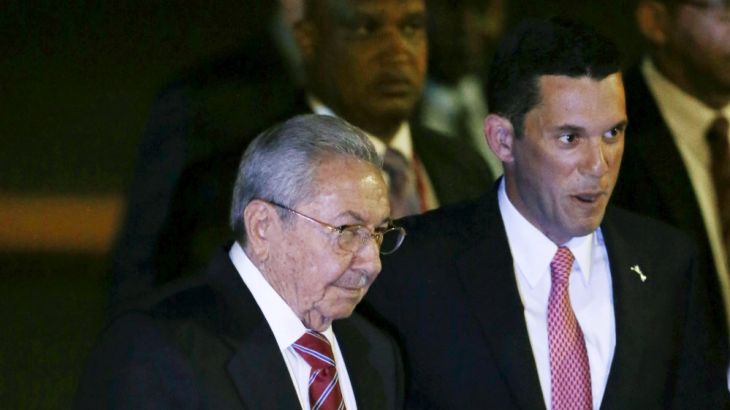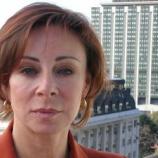Kerry holds landmark talks with Cuban counterpart
Highest-level meeting between Cold War-era foes since 1958 held as leaders arrive in Panama for Summit of the Americas.

The Cuban and US foreign ministers have held a historic meeting in Panama, the highest-level encounter between the two countries before their presidents attend a landmark summit.
The US State Department’s Twitter account published a picture of John Kerry, secretary of state, and his Cuban counterpart Bruno Rodriguez looking at the camera with straight faces as they shook hands late on Thursday, on the eve of the Summit of the Americas.
Keep reading
list of 4 itemsUS House approves aid package worth billions for Ukraine, Israel
Will India’s election be free and fair?
Togo approves constitutional reform changing how president is elected
It was the first time the chief diplomats from the two nations met since 1958, one year before Fidel Castro’s revolutionary guerrillas came to power.
Kerry and Rodriguez were in a room with two chairs and a glass coffee table, but the tweet did not reveal more.
The presidents of the two nations, Barack Obama and Raul Castro, landed in Panama in advance of their own encounter set for the 35-nation summit on Friday and Saturday.
Al Jazeera’s Diplomatic Editor James Bays, reporting from Panama City, said this year’s summit was historic because all of the countries in the Americas were present for the first time.
“The Summit of the Americas is held every two years and, in some ways, this year’s meeting is a coming of age,” he said.
“A lot of attention will be on the relationship of those two countries.”
Diplomatic thaw
Obama was moving closer to removing a major hurdle in the US-Cuba diplomatic thaw, as a US senator indicated that the State Department recommended removing Cuba from a list of state sponsors of terrorism.
Senator Ben Cardin, a leading member of the upper chamber’s foreign relations committee, said the removal was “an important step forward in our efforts to forge a more fruitful relationship with Cuba”.
| Mending US-Venezuela ties |

Panama City, Panama – Despite the frosty relations between the US and Venezuela, which at one point seemed would prevent a final declaration at the summit, there seems to be some signs of a rapproachment. President Obama’s statement that Venezuela represented a security risk to the US gave President Nicolas Maduro fresh ammunition with which to claim that the US was plotting to overthrow him. Now, Maduro seems to be extending an olive branch, saying he wants better relations with the White House. Maduro’s comments followed comments by a US official who said Venezuela did not represent a risk to the US. Diplomats hope the clarification would “leave the door open” to a final statement. – Lucia Newman, Al Jazeera Latin America Editor
|
During a trip to Jamaica before heading to Panama, Obama confirmed that the State Department had completed a review of Cuba’s inclusion on the list, but that he declined to say what its recommendation was.
Having Cuba’s name on the list has been a major sticking point in negotiations aimed at reopening embassies, which closed after the foes broke relations in 1961.
The blacklisting means that Cuba is subject to a ban on weapons exports and economic aid as well as financial sanctions that make it difficult to get World Bank and other loans.
Cuba was first put on the list, which also includes Syria, Sudan and Iran, in 1982 for harbouring ETA Basque separatists and Colombian FARC fighters.
Obama said the overall talks on establishing diplomatic relations with Cuba was moving along as he expected.
An announcement about the “terror list” during the Panama City summit would add to the historic symbolism of the gathering.
The meeting will mark the first time that a Cuban leader attends the event.
Before Cuba can be removed from the list, Congress will have 45 days to decide whether to override Obama’s recommendation.
US politicians who have been critical of the diplomatic detente could seize on the review of the list to further attack Obama’s Cuba policy.
Speaking to Al Jazeera, Juan Carlos Hidalgo, a Latin American policy analyst at the CATO Institute, said US-Cuba negotiations had been held in secret, “so we don’t know what’s going to happen”.
“It’s been a riling point for over half a century for Cuba, which has been presenting itself as a victim of US aggression. But now, all of a sudden, the US wants to be friends with [Cuba],” he said.
Blog: New beginning, old conflicts at Panama summit
“If you look at statements from Castro over the past months, it looks like he is trying to raise the price tag by asking the US to return Guantanamo Bay or lift the sanctions in return for closer ties.”
In January, Castro said that Cuba would not improve relations with the US unless it returned the Guantanamo Bay naval base and military prison to Cuba and lifted the five decades-old sanctions.
A scene of tensions among Cuban dissidents and government sympathisers emerged in Panama City on Thursday when about 100 Castro regime supporters jeered dissidents as they arrived at a Latin American civil society forum.
Cloud on horizon
Al Jazeera’s Bays said a cloud on the horizon at the Panama City summit was Obama’s issuing an executive order for sanctions against Venezuelan officials a month ago, which could be viewed by some countries as “a clumsy move”.
![Obama says the overall talks on establishing diplomatic relations with Cuba are moving along as he expected [EPA]](/wp-content/uploads/2015/04/add36176fe58438bb766ad2319776812_18.jpeg)
The sanctions were imposed against Venezuelan officials accused of human-rights abuses in a crackdown on the opposition.
Venezuelan President Nicolas Maduro, Cuba’s main ally in the region, said on Thursday he had gathered 13.4 million signatures in a petition calling for Obama to lift his executive order, which calls Venezuela a US national security threat.
Maduro welcomed White House statements saying it does not see Venezuela as a threat after all, adding that it could “start a new historic era in relations”.
Feature: Obama-Castro meeting has Cubans expecting freedom
Reporting from Panama City, Al Jazeera’s Latin America Editor Lucia Newman said: “President Maduro seems to be extending an olive branch, saying he wants better relations with the White House.
“This happened after a top Obama aide told reporters at a pre-summit briefing that ‘Venezuela does not represent a risk to the United States’.
“This attempt to repair the damage caused by what has been widely described by diplomats as ‘an unnecessary and unfortunate comment by Obama’, leaves the door open for a final summit agreement.”
![The Cuban-US foreign ministers' meeting in Panama is said to be the highest-level encounter between the two countries' presidents [REUTERS]](/wp-content/uploads/2015/04/c057fa620adc4ba8a005926b190f9871_18.jpeg)